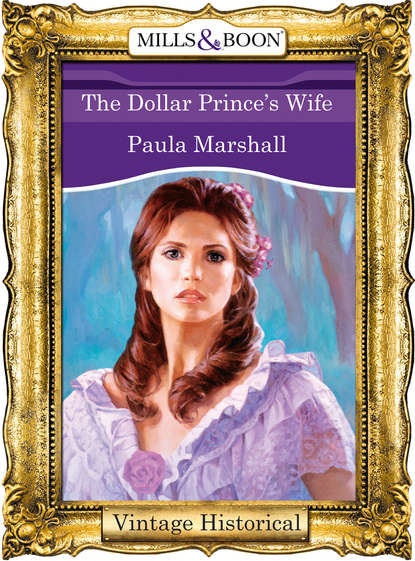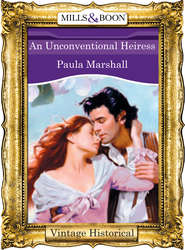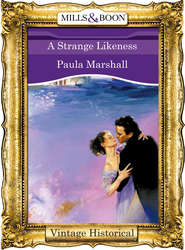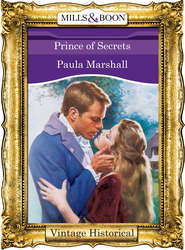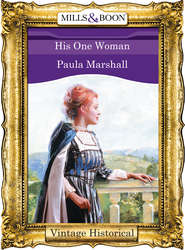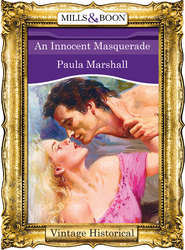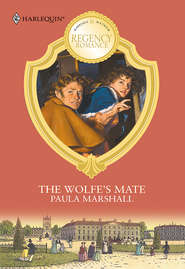По всем вопросам обращайтесь на: info@litportal.ru
(©) 2003-2024.
✖
The Dollar Prince's Wife
Настройки чтения
Размер шрифта
Высота строк
Поля
There was something about him which made her want to talk to him. He held himself, she thought, as though he were prepared to listen to her. She wondered for a moment what it would be like to be as beautiful as he was and to possess such perfect manners into the bargain. He even made Violet look a little frantic. What did being such a nonpareil do to you? Would she have his effortless calm if she were ever to become his female equivalent?
Later she was to laugh to herself for having such an absurd thought. Of course, she could never be like him. Pigs might fly sooner, her old nurse had once said of a similar piece of nonsense of hers.
‘Well, that disposes of tea as a subject of conversation,’ returned Cobie equally merrily. ‘Now, how about the weather? Shall we have a go at meteorology as a topic? It seems to be a favourite one over here. For example: Do you think it will continue fine, Lady Dinah? Or would you rather allow me to ask you a personal question along the lines of: Why are you in the library?’
‘That would be a fair one to ask,’ answered Dinah gravely, sitting down so that he need no longer stand, ‘seeing that you were kind enough to answer my question about the library earlier. I thought that I might do some work. Faa, that’s Professor Fabian, told me that the last Lord Kenilworth but one had accumulated a superb collection of memoirs and papers of all the most important statesmen of the last three centuries. If I’m ever allowed to read history at Oxford, it would give me a flying start to have gone through them carefully, making notes.’
So, Lady Dinah Freville took after her real father and, all in all, she was proving to be a very unlikely cuckoo in the Rainsboroughs’ nest. Cobie doubted very much whether Dinah would ever be allowed to go to Oxford. Violet, for one, would never agree to it.
‘A most sensible notion,’ he said approvingly. ‘There is nothing like reading those documents which have come down to us from the past to give us a true idea of it. I congratulate you, Lady Dinah: not many scholars have grasped that.’
Goodness, Rainey’s Yankee barbarian sounded just like Faa when he was talking to her seriously! Did he treat Violet and Rainey to such learned and erudite discourse? These were Faa’s words for what went on in academic tutorials and the dons’ discussions. She rather doubted it.
‘Do many Americans think that, Mr Grant? Are American statesmen like ours, do you know? Have you met many politicians over there? I suppose that New York is not much like Washington.’
‘Indeed not,’ he said, turning his amazing eyes on her again, something which, oddly enough, made Dinah feel quite dizzy. To amuse her, for he found her eager interest strangely touching, he began to tell her some comic stories of what politicians got up to in the United States, which set her laughing.
‘I suppose the only real difference between yours and ours,’ she volunteered, ‘is that yours are more straightforward and ours are more hypocritical. I was always told that the First Lord Rainsborough—his name was Christopher Freville—was given his title for some grand diplomatic work he did for King Charles II at the time of the Dutch Wars.
‘Only Faa told me one day that that was all a hum, and he also told me where to look in the papers to find the true story. He had discovered it the year he came here to be Rainey’s tutor, and had begun to catalogue our archives before he ran off with Mama. So, the last time I came, I found the papers—and Faa was right.
‘Christopher, whose ancestral home was Borough Hall, was a boon companion of King Charles II,’ she explained, her eyes alight with amusement. ‘He was a King whose habits we are all supposed to deplore, although he doesn’t seem to me to be so very different from the present Prince of Wales.’
She would never have uttered this last piece of heresy in front of Violet, but the man to whom she was talking seemed to provoke her into making such lively indiscretions.
‘He was just a nobody about the court, you understand, a mere gentleman-in-waiting. One day the King went for a walk—he was a great walker, Faa said—and it began to rain heavily. He was only wearing a light coat and Christopher was wearing a thick one. He saw that the King was wet, and offered him his own in exchange.
‘That night, at court, they all drank too much, and the King told Christopher that he could have any favour he wanted as a gift for having lent him his coat. Christopher told the King that he could keep the coat—provided that he agreed to make him an Earl in exchange for it. Instead of condemning him for his impudence, the King laughed and said, “Since you saved me from the rain I shall call you by its name—you shall be Lord Rainsborough.”
‘Christopher was a pretty frivolous fellow. He was never a diplomat or statesman as his descendants have liked to pretend. Making him an Earl was just one of King Charles II’s jokes—he was very fond of them, Faa says. Please don’t tell Violet the truth—she wouldn’t find it at all amusing.’
To be sure she wouldn’t, Cobie thought, while thanking Dinah for telling him of this comic piece of unwanted family history.
A little later he was to discover that Violet wouldn’t find anything amusing about her half-sister. After a happy hour’s conversation the library door was flung open by an imperious hand, and Violet entered, resplendent in an old-rose tea-gown.
She stared at Cobie and Dinah laughing together over the chess set which stood permanently ready on a marquetry table in front of yet another window. Dinah was finding that Mr Grant played an even better game of chess than Faa. Violet, however, approved of neither the game, Mr Grant, nor Dinah.
She particularly didn’t approve of Dinah.
‘So there you are, Cobie,’ she said unoriginally, sailing over to them like some galleon strayed from the high seas, ‘in the library. Of all odd places to find you! Have you had tea?’
She stared down at the chess game where Cobie’s Black Queen and Knight were pinning Dinah’s White Queen. She drawled mockingly, ‘What a hole you are in, darling,’ and, throwing out a careless hand to wave at Dinah’s pieces, she knocked them all flying.
‘Oh, sorry,’ she exclaimed, still mocking, ‘but really, Dinah, no need for you to carry on with that. Now, why don’t you go upstairs and find something suitable to wear—that thing you have on looks more fitting for the nursery than the dining room. Oh, and thank Mr Grant prettily for taking the trouble to entertain you.’
She spoke as though Dinah were a fractious three-year-old, and Cobie was her elderly uncle.
Cobie, caught between red rage at Violet’s casual cruelty, and wry amusement at the way in which she was expressing it, was unhappily aware that anything he might say to comfort the poor child would only give Violet the opportunity to cut her up even more savagely, said nothing.
Dinah, her face flaming scarlet, rose and prepared to retreat upstairs to change—although into what she did not know. She was well aware that she possessed nothing of which Violet would approve. Violet had always had the power to make her feel ugly, clumsy and stupid—particularly stupid.
The happiness which she had been experiencing over the last hour had flown away quite. She now felt that Mr Grant must have been concealing his boredom skilfully, whereas until Violet had arrived she had thought him to be enjoying their impromptu tête-à-tête as much as she had been doing.
‘Y…y…yes,’ she began to stammer miserably. She bent down to rescue the White Queen which had rolled under the table and, when she rose with it, found that Mr Grant was gently taking it from her to replace it on the board.
‘We must resume our game another day,’ he told her gravely, his amazing blue eyes hard on her. For her sake, he dare not say any more than that. He would offer Violet no ammunition to use against her.
Violet’s eyes were boring holes in her for some reason which Dinah couldn’t understand.
She said disjointedly, ‘No need, thank you…Mr Grant… I’m not really a very good player…mustn’t bore you.’
Cobie was quite still: a danger sign with him if either of the two women had known it. ‘Oh, you didn’t bore me, Lady Dinah. I enjoyed my hour with you.’
Violet tapped her foot on the ground peremptorily until Dinah, blushing furiously and unable to answer Mr Grant coherently, left them.
The door had barely had time to shut behind her before Violet said nastily, ‘I enjoyed my hour with you! Really, Cobie, there was no need for you to go quite so far to keep the child in countenance—a quiet “thank you” would have been more than enough.’
Could she conceivably be jealous of Dinah? And why? Until Violet had walked in, Dinah had been a happy and interesting companion, but it had become immediately apparent by Dinah’s subsequent behaviour that this was not the first time Violet had treated her with such cold cruelty. All her charming composure had been destroyed in an instant.
Cobie’s dislike of Violet was growing at the same speed. He made an immediate resolution to try to protect the unloved child. She reminded him strongly of another whom, long ago, he had also tried to protect but had failed to do so through no fault of his own. The memory of her death would haunt him all his life. Pray God he could do more for Dinah, if only while he was at Moorings.
Nothing of this showed. He was charm itself to Violet, but she was shrewd enough to notice that he never mentioned Dinah to her. She could not have said why seeing Dinah laughing with Cobie had flicked her on the raw. Perhaps it was because, at nearly forty, she was approaching the time when no one would think of her as ‘that great beauty, Violet Kenilworth’ but instead she would be spoken of as ‘Violet Kenilworth—who had once been a great beauty’.
And Cobie was only twenty-nine to Dinah’s eighteen.
Chapter Three
T hat part of London society which had been invited to the Kenilworths’ house party and a large number of the more important folk in the county of Warwick were assembled in the Great Hall at Moorings for a reception being given by the new Lord Lieutenant of the county, Lord Kenilworth, to mark his accession to that honour.
South Africa had been looted of diamonds to hang around beautiful necks and to depend from beautiful ears. It would not be exaggerating to say that the women present were wearing a king’s ransom between them—except for Lady Dinah Freville, of course. She hid herself in a corner and watched them walk to and fro, waving their fans like the lovely peacocks they were.
Among the guests who made up the house party was one who had only recently been introduced to the Kenilworths by the American Envoy and his wife, who were also present. They were, indeed, apart from his hosts, the only persons in the whole vast Hall whom he knew.
He was, as the saying had it, yet another rich Yankee robber baron, Mr Hendrick Van Deusen, who had made himself a fortune in Chicago, having appeared there from nowhere some years ago. He was a heavy-set man in his early forties, resplendent in his new English evening dress from Savile Row.
Violet had flung an invitation at him on hearing of his immense wealth and that he liked to play cards for money. Her poverty-stricken brother, Rainsborough, must be given the chance to win some of his loot from him at Moorings.
Like Lady Dinah, whom he had not yet met, he had hidden himself away in a small ante-room which opened off the Hall where he could both see and hear the passing show, but could not be seen himself. A wise man ought to know more than other people wished him to. He soon gained his reward for his cunning.
A pair of society women, resplendent, but flimsy, butterflies, both came and stood near him, gossiping loudly about their hostess.
‘I see that Violet Kenilworth’s Apollo is one of the party,’ drawled the prettier of the two, amusement on her face and in her voice. ‘I hear that she granted him the privilege of arriving before the rest of us.’
‘Now, now, Emily, don’t be jealous—there’s no point in it, none at all. There’s only one at a time for him, they say, and at the moment it’s Violet. And she’s got her hooks into him well and truly.’
‘I can’t say that I blame her. I’d have had my hooks in him well and truly if I’d had the good luck to meet him first. Tell me, is it true that he’s the American Envoy’s brother-in-law?’
‘By proxy,’ chuckled her friend, ‘only by proxy. Her half-brother, so they say. Not much alike, are they? Apollo is as blond as she’s brunette.’





